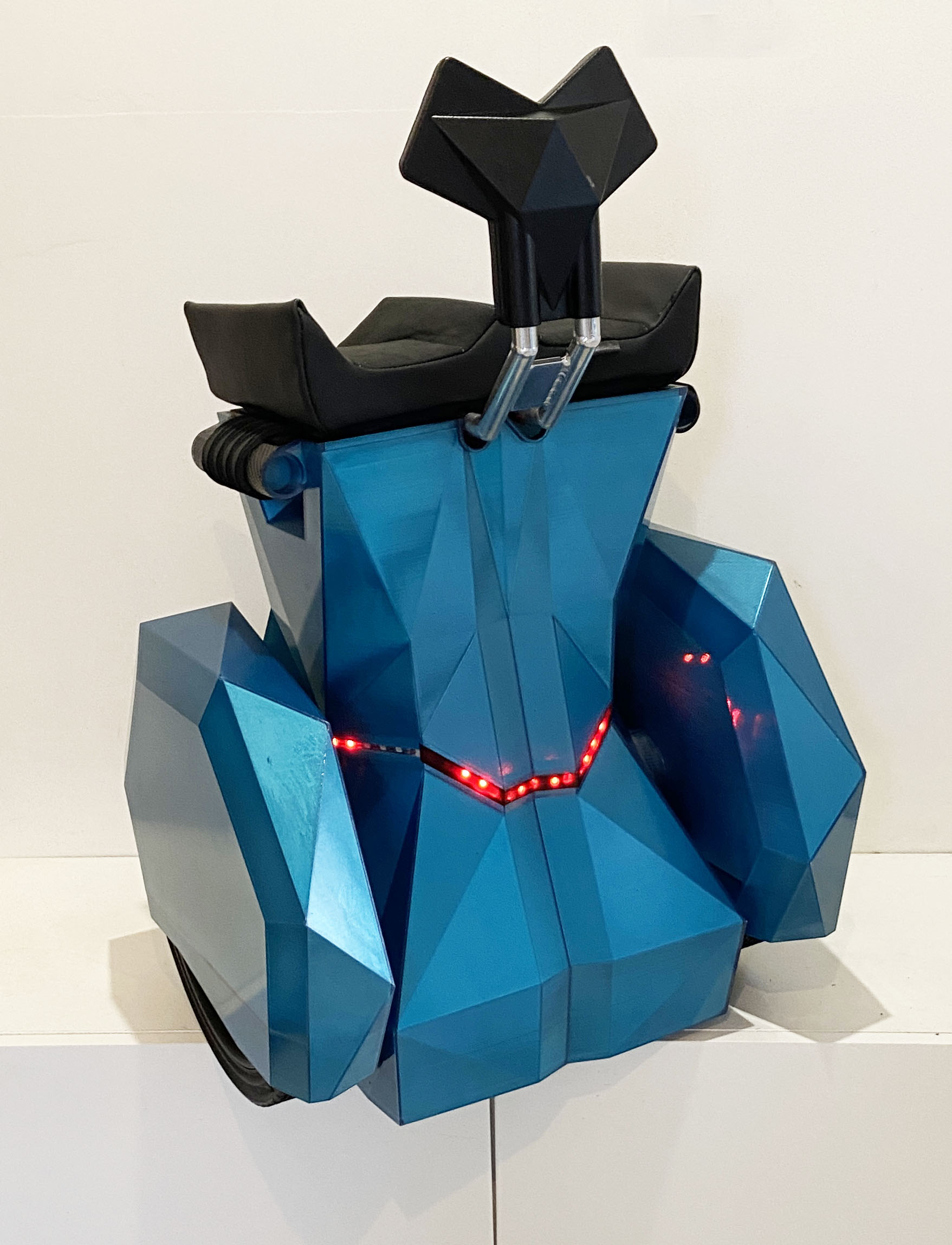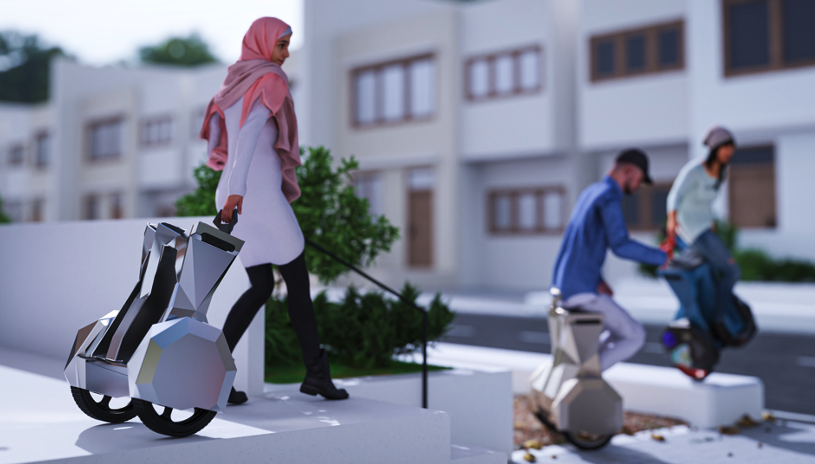Summary
- Profile Type
- Technology offer
- POD Reference
- TOGB20250213010
- Term of Validity
- 13 February 2025 - 13 February 2026
- Company's Country
- United Kingdom
- Type of partnership
- Commercial agreement with technical assistance
- Research and development cooperation agreement
- Investment agreement
- Targeted Countries
- Czechia
- Croatia
- Germany
- Finland
- Cyprus
- Belgium
- Austria
- Bulgaria
- Estonia
- France
- Denmark
- Sweden
- Hungary
- Lithuania
- Italy
- Latvia
- Ireland
- Greece
- Romania
- Slovakia
- Netherlands
- Luxembourg
- Malta
- Slovenia
- Spain
- Portugal
- Poland
Contact the EEN partner nearest to you for more information.
Find my local partner
General information
- Short Summary
- A UK SME developing a pedestrian-safe form of accessible micromobility is seeking research-cooperation agreements, with an organisation that operates large venues and commercial with tech assistance agreements with manufacturers that have experience in building and distributing mobility-tech that has similar complexity, such as powered-wheelchairs. Their knowhow is in clinical ergonomics, assistive-tech for rehabilitation, and manufacture of extreme-sports (bicycle/motorcycling) equipment.
- Full Description
-
A UK-based SME is collaborating with an established Agri-tech/logistics robotics company to develop a new pedestrian-safe form of accessible micro mobility. The founding team has experience in both accessibility sector (as a clinician, ergonomics and assistive-tech), and the development and marketing of extreme-sports bicycles, alongside consumer-tech new product development/fulfilment.
The SME has developed a new form-factor of self-balancing micro mobility, as a solution to the cofounder’s own mobility problems with the use of a wheelchair, they identified many flaws of the ‘Segway’ design and overcame its unpredictability and instability especially when used by unskilled riders, or on uneven surfaces.
Their research uncovered many barriers to adoption, some technological, the majority social/behaviour-change, and believe they have solved those to create a very convenient, and engaging vehicle. Reducing the weight to less than that of an average bicycle (enables one-handed lift), this has massively improved the ‘independence factor’ for women and young people.
There are several ‘self-balancing wheelchairs’ on the market, they all weigh too much for the rider to lift them without assistance, they don’t have any off-road capabilities and are prohibitively expensive. They all carry the rider sat low-down, below adult eyelevel. The SME consider small cars, bicycles and e-scooters as more direct competition, but those formats are very limited to where they can be used, as you cannot safely ride any of them indoors.
The main features of the solution developed by the SME include: the vehicle retracts its wheels to park, effectively becoming portable-luggage, not a wheeled vehicle (therefore this would be allowed on escalators, and in public-transit carriages).
The handsfree ergonomics allows the rider to shift their weight, intuitively adjusting how they control the vehicle through leaning, or by foot-pressure, this provides great agility and safety. The rider isn’t constrained by armrests or handlebars (both are contributing factors to the high number of head and upper-body injuries from existing personal-mobility formats).
The SME is now seeking research-cooperation agreements with research-partners, who have expertise and responsibility in venue-accessibility, health & safety, and value of visitor-experience to support the development and testing of the vehicle. The SME are also open to partnering with research partners to submit bids for relevant Horizon Europe funding calls.
In addition to this the SME is seeking commercial with tech assistance agreements. Ideally, the SME would like to run a small-scale trial with an organisation that operates large venues and is seeking to improve accessibility (replacing unpopular mobility-scooters), enabling visitors to get around the venue without modifying existing landscaping, walkways, carparks or architecture. The SME would provide demo vehicles, and an on-site technician, for the partner to evaluate, before allowing the public to test-ride. - Advantages and Innovations
-
The vehicle design evolved to no-longer resemble a mobility-aid, it now carries the user at ideal adult-eyelevel and incorporates a novel suspension system that dynamically improves stability, compared to all competitors’ products.
The excellent balance at zero Kilometres per hour, combined with the unique, ergonomics solution (vehicle is very compact, it doesn’t extend beyond the rider’s proprioceptive zone), makes the vehicle far safer than bikes, e-scooters/mobility-scooters, around pedestrians.
The vehicle’s low mass makes it responsive and enjoyable to use. Competing products have much higher mass, inertia and momentum which causes a delay in movement.
The 14Kg weight allows the user to lift their vehicle one-handed, it can be ridden up kerbs, but it’s also easy to carry up steps, and it fits on an escalator-step (with its wheels retracted, it becomes ‘luggage’ and is permitted on escalators).
The unit-cost is half of nearest competitor, due to all-proprietary components and IP, fewer parts, and less materials. - Stage of Development
- Lab tested
- Sustainable Development Goals
- Goal 9: Industry, Innovation and Infrastructure
- IPR status
- IPR granted
- IPR notes
- WIPO Design-Protection for ergonomics/form-factor is registered.
Partner Sought
- Expected Role of a Partner
-
For research cooperation agreements, the SME are seeking a partner with expertise and responsibility in venue-accessibility, health & safety, and value of visitor-experience to support the development and testing of the vehicle.
For Commercial with tech assistance agreements, the SME are interested in partnering with a manufacturer who has experience with building and distributing mobility-tech that has similar complexity such as e-Bikes, micro mobility or powered-wheelchairs. The SME is approaching the design for manufacture stage and would like to match with a factory who has an existing production-line, that they could then refine their product’s components and modules to suit that existing line.
If the partner is an Investor; the SME would like to partner with someone who has experience working with hard-tech across global market, and/or knowledge of sales and branding to female and young-persons sectors. - Type and Size of Partner
- SME 11-49
- SME <=10
- R&D Institution
- SME 50 - 249
- University
- Big company
- Type of partnership
- Commercial agreement with technical assistance
- Research and development cooperation agreement
- Investment agreement
Dissemination
- Technology keywords
- 02008003 - Logistics
- Market keywords
- 09004008 - Other manufacturing (not elsewhere classified)
- Targeted countries
- Czechia
- Croatia
- Germany
- Finland
- Cyprus
- Belgium
- Austria
- Bulgaria
- Estonia
- France
- Denmark
- Sweden
- Hungary
- Lithuania
- Italy
- Latvia
- Ireland
- Greece
- Romania
- Slovakia
- Netherlands
- Luxembourg
- Malta
- Slovenia
- Spain
- Portugal
- Poland

